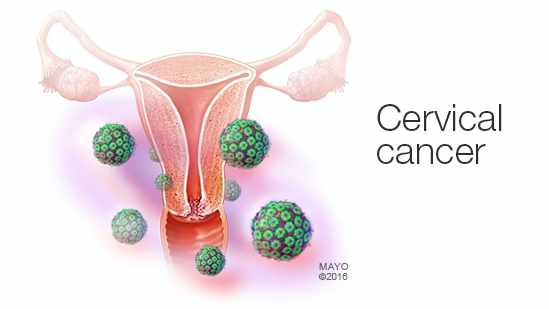-
Screenings, Awareness Help Prevent Cervical Cancer
 Once the leading cause of cancer death in women, cervical cancer cases have lessened in recent years. However, the Centers for Disease Control and Prevention note that more than 12,000 cases of cervical cancer were diagnosed and more than 4,000 women died from the disease in 2012. These data indicate cervical cancer is still a major threat to the well-being of women.
Once the leading cause of cancer death in women, cervical cancer cases have lessened in recent years. However, the Centers for Disease Control and Prevention note that more than 12,000 cases of cervical cancer were diagnosed and more than 4,000 women died from the disease in 2012. These data indicate cervical cancer is still a major threat to the well-being of women.
Sonal Grover, M.D., Mayo Clinic Health System obstetrician and gynecologist, answers common questions about cervical cancer.
What is cervical cancer?
Cervical cancer occurs in the lower part of the uterus known as the cervix, which connects the uterus to the vagina. The most common types are squamous cell carcinoma — occurring in squamous cells, which line the outer part of the cervix — and adenocarcinoma — developing in glandular cells in the cervical canal.
Numerous strains of the sexually transmitted infection human papillomavirus (HPV) contribute to the growth of cervical cancer cells. Many women’s immune systems combat HPV, preventing the virus from causing cancer. Yet, some women are more susceptible to cervical cancer as HPV lives in their bodies for years and aids in the emergence of cancer cells.
Are symptoms obvious?
No. In fact, the majority of women with cervical cancer won’t experience any signs in early stages. As the disease progresses, you may notice:
- Vaginal bleeding after intercourse, between periods or after menopause
- Watery, bloody vaginal discharge that may be heavy and have a foul odor
- Pelvic pain or lower back pain
Talk to your health care team as soon as possible if you have worrisome symptoms.
What elevates risk?
The following are risk factors for cervical cancer:
- Multiple sexual partners
- Sexual activity at a young age
- Other sexually transmitted infections
- Weak immune system
- Smoking
How can you prevent cervical cancer?
The most effective ways to reduce cervical cancer risk include:
- Getting vaccinated against HPV. The HPV vaccine is available for females ages 9 to 26.
- Having routine Pap tests. Most health care experts recommend beginning Pap tests, which detect precancerous conditions of the cervix, at age 21.
- Practicing safe sex. Limiting sexual partners, using condoms and abstaining from sex at early ages helps limit risk.
- Not smoking. Don’t smoke, or quit if you do. Smoking is correlated with squamous cell cervical cancer.
Do treatments exist?
Yes. Depending on the stage of the disease, your health status and personal preferences, different treatment options are available. The earlier cervical cancer is detected, the more successful treatment tends to be. Common treatments include surgery, radiation, chemotherapy or a combination of all three.
After consulting with their health care team, some women may choose to have a hysterectomy (removal of the uterus) to cure early-stage cervical cancer and prevent recurrence. A hysterectomy inhibits any chance of conceiving a child.
"Through awareness and diligent health management, patients and health care providers can continue to reduce the instances of and casualties from cervical cancer," says Dr. Grover.







